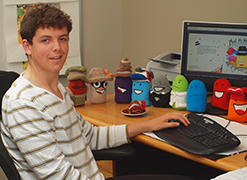
Young Writer and Publisher
When did you first realise that you had a different way of thinking?
In Year 12 my teachers noticed my school performance was deteriorating and they began to question my attitude. Up until then I’d been a good student, credited with good marks, attitude and attendance.
My teachers had meetings about me and rang my parents. There was frustration building on both sides. I knew this wasn’t good and I wasn’t coping with the tension. I dropped out of school in the middle of Year 13.
Later that same year I discovered I had a different way of thinking when I was tested for and confirmed as dyslexic and it was a great relief to know. A lot of things started to make sense from then on and I felt empowered.
What was your experience of school? Did you get involved in creative fields such as storytelling and publishing?
My school years were divided into two parts really. The first was normal, from years 1 to 11. In Year 2, I entertained the class, dressing up as Professor Lucas and reading story books out loud to the class. Professor Lucas was allowed to choose the stories he read out and they were, of course, the ones I knew off by heart.
Over the following years I did very well in some subjects and badly at others only to find the next year I do well in the others and badly in some.
I was afraid of teachers and how stupid they could make me feel. The ones who put me at ease got the best out of me.
In the early years there was a lot of opportunity for storytelling and being more creative in that supportive environment. I was creating at school and after school, things like mini movies, computer cartoons, audio taping stories, The Gecko Times – “the most irrelevant news since 1873”, photography and making up characters as soft toys.
Every year at High School I did well at speeches, what my teachers didn’t realize was they were all impromptu.
As the academic workload increased the creative opportunities dried up at school and at home. Increasing amounts of homework stole more and more time from me too.
What are the main work challenges that you have had to overcome since leaving school?
Storytelling and creating stories is what I’ve always done and what I want to do. I’m doing that full-time now so life is great! The challenge now is making it a viable career.
What do you think are some of the positives and negatives of dyslexia?
The most noticeable positive is creativity and innovation, the biggest negative is that reading is a total pain. The hardest thing about being dyslexic is when the system doesn’t allow for our different mindset.
The world needs new things and improved ideas and given the chance dyslexics can contribute in a new way and make change for the better.
What advice would you give young New Zealanders who are dyslexic?
If you think you might be, or someone close to you might be dyslexic, get tested as early as possible. Knowing why you think the way you do is important and empowering.
Figure out what you’re good at and do it. You don’t have to follow recipes to be a top chef and you don’t have to be a good reader to write story books.
If you’re creative and work well with others it’s all possible.
Click here to return.
